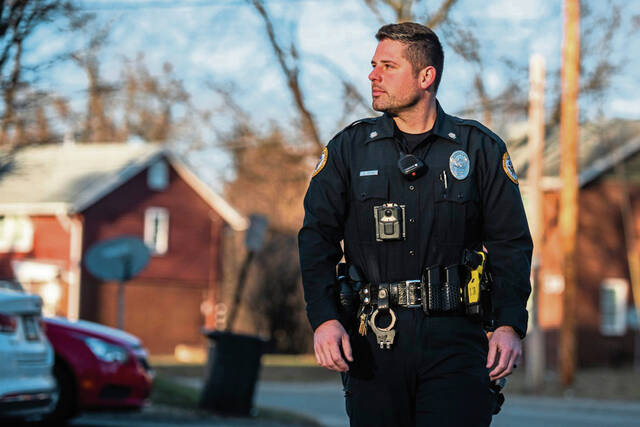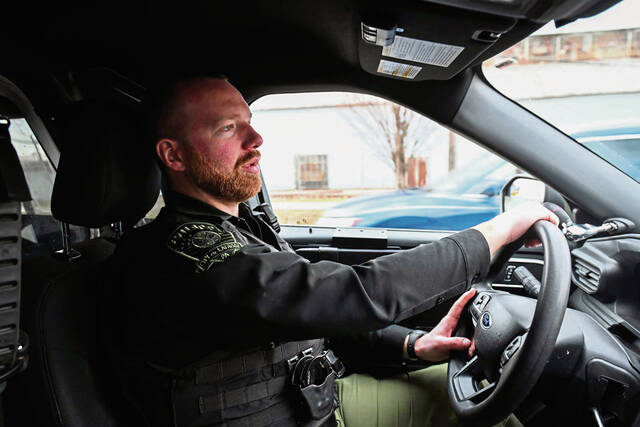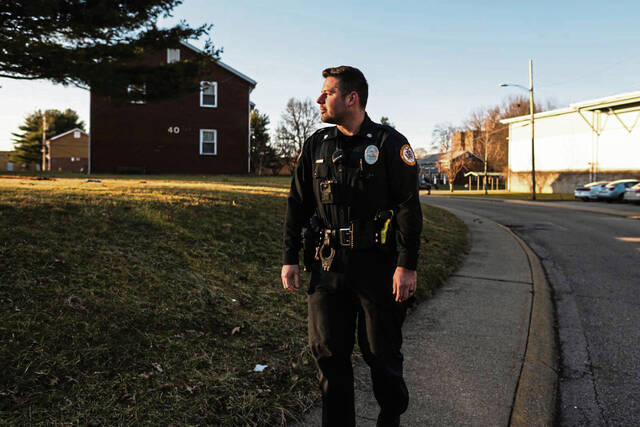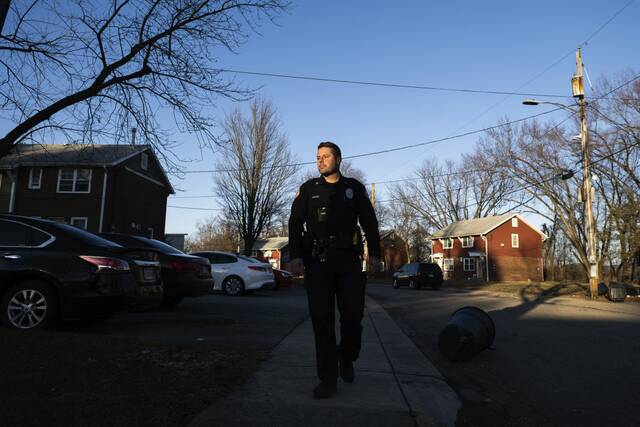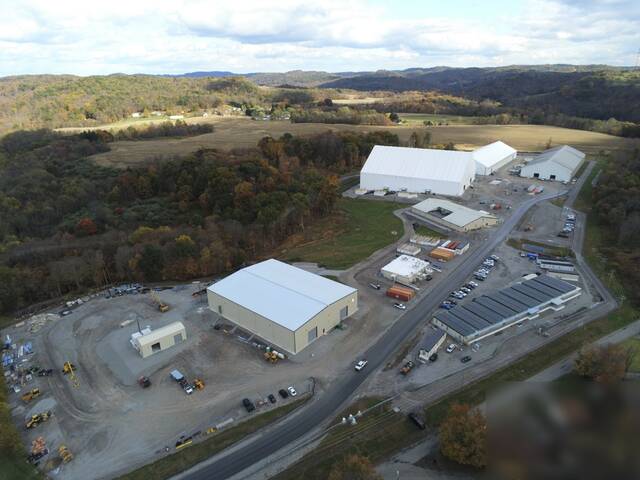When Washington Township police officers had the idea more than a year ago to work longer shifts, Chief Jason Montgomery was all ears.
Since January 2024, Montgomery has been scheduling officers for three 12-hour shifts per week instead of five eight-hour shifts. Officers say they have a better work-life balance and less overtime, while the township gets better coverage because they require fewer total shifts per week, the chief said.
“I’d rather stick with it the rest of my career than go back to (eight-hour shifts,)” Washington Township Officer Christian Disciscio said, citing the longer time off as a benefit. “You have the ability to schedule appointments during the week and have more time with family.”
Within the past year, communities such as Harrison, Tarentum and Latrobe made the change to longer police shifts, joining larger departments including Pittsburgh and the Allegheny County Housing Authority.
“It seems to be more convenient, and officers like it better,” said Mike Vogel, chief of police for the housing authority and president of the Pennsylvania Chiefs of Police Association. “You have to be cognizant (of court time), but it seems to be working out.”
Vogel’s department oversees housing complexes across Allegheny County and has used a four-day, 10-hour schedule for at least seven years. He believes a longer shift is beneficial in most instances and more departments should consider moving away from the traditional eight-hour shift.
“It’s in the best interest of administrators to take a look at it and work with the departments to see if it’s something they’re interested in, and do it,” Vogel said. “It could really boost morale.”
Perks of a longer day
Washington Township has 10 full-time officers, including Montgomery. With the new schedule, there are at least two officers on duty at all times and sometimes three during the day.
Under the eight-hour day, there were guaranteed open shifts every month, Montgomery said.
Township officers use the Pitman schedule: Work two days, take two days off; work three days, then take two days off; work two days, then take three days off. That gives officers off every other weekend.
Montgomery said overtime is down, though he didn’t have specifics. He also finds officers filling shifts for each other is easier under the 12-hour day. The idea, he says, appears to be catching on with smaller departments.
“It does seem to be trending in that direction,” Montgomery said. “Guys like their time off like anyone else. I do see it as a good thing.”
Pittsburgh police moved to four 10-hour shifts per week last year, spokeswoman Cara Cruz said. It wasn’t intended to cut costs but was a way of enhancing officer wellness.
“The (four-day, 10-hour) model is also designed to provide more efficient coverage of the city when officers are on patrol,” Cruz said. “While the bureau is always evaluating initiatives to ensure their value and efficacy, there are no immediate plans to move away from the 4/10 model, which is popular with many officers.”
Vogel said he has not heard complaints from departments statewide that have changed to a 10- or 12-hour work day.
“They feel as though it’s advantageous to go that route, if it’s doable,” Vogel said. “I think it’s more attractive trying to recruit officers.”
Shift history
For years, Harrison police used the eight-hour “21-turn” schedule. That calls for officers to work five days of daylight shift with one day off, followed by five days of afternoon shift with one day off, followed by five days of midnight shift with two days off, Chief Brian Turack said.
After approval by township commissioners in August, Turack’s force shifted to 12-hour shifts at the end of last year.
“Many of our police officers, myself included, realized many difficulties with the 21-turn, eight-hour schedule,” he said. “Many would say that it impacts mental health, physical health, family relationships and more.
“Overworked officers burn out and are expected to make life-or-death decisions, which is impossible to do effectively when sleep deprived.”
Because the 12-hour shifts account for longer time off than an eight-hour shift, officers have more built-in recovery time from traumatic or stressful incidents between shifts.
Turack believes the 21-turn, eight-hour schedule was followed in many steel mill towns because a number of officers came from mill jobs into police work. The schedule was an easy transition, he said.
“Although many departments in Southwestern Pennsylvania worked this scheduling format, most of them changed to a more reasonable schedule over the past several decades,” Turack said. “The 21-turn, eight-hour schedule is likely well-suited to assembly line or production work, but police work most certainly is not that.”
‘An officer-wellness move’
Latrobe police initiated 12-hour shifts in February, said Chief Richard Bosco. He described the shift as “an officer-wellness move.”
“We’re all happily optimistic,” he said. “It’s not new to law enforcement, but it’s new to this area.”
Every officer gets a three-day weekend in a two-week time frame. They never work more than 36 hours in three days. That helps curb burnout, Bosco said.
Turack agreed, saying research indicates that allowing officers sufficient or additional time off to decompress between traumatic incidents allows them time to process their calls, which may allow them to heal from those incidents more effectively.
Roughly three-fourths of police officers surveyed by a Police1.com study cited a lack of time due to work or personal commitments as the biggest barrier to maintaining or improving their health.
While Latrobe officers’ shifts have increased in length by 50%, they are eligible for 186 days off per year.
Latrobe also projects cost savings with the new shifts, Bosco said. Because it is new, total shifts haven’t yet been completely realized.
While cost savings weren’t the primary driver for the Tarentum police to move to 12-hour shifts, borough Manager Dwight Boddorf said the enhanced coverage and efficiency helps optimize resources.
When Tarentum and Brackenridge merged police forces in July 2023, they began a trial of 12-hour shifts, Boddorf said. In January, Tarentum council and the police union agreed to make the change permanent. The borough retains the option to revert back to eight-hour shifts.
“Officers now have more family time and a consistent schedule, with every other weekend guaranteed off. This balance has significantly boosted morale,” Boddorf said.
Latrobe’s Bosco agrees the longer shifts provide equity and a better quality of life for officers. Younger officers get a three-day weekend each pay period, which previously was almost unheard of, Bosco said.
Officer Josh Gettig has worked for the housing authority for about a year and spent a dozen years working for California University of Pennsylvania/Penn West. Working a 10-hour day isn’t a big adjustment, he said.
“I think it’s the best shift. You get three days off, and it’s more time with family,” he said.
Because Harrison started the 12-hour shifts recently, Turack said it’s too early to tell if there are cost savings or whether the schedule helps to recruit officers.
Any help with budgets only helps many small communities, where the cost of police coverage often is one of the biggest expenses. Police salaries in Harrison, for example, comprise almost 28% of the township’s roughly $6 million budget, according to 2025 budget figures.
One thing Turack is sure of: Police officers stay longer when they’re satisfied with their working conditions.
“I would definitely say that it helps to retain officers,” he said.



